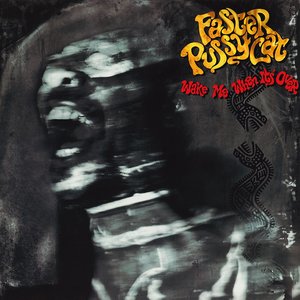Published on Jan 4, 2000
When we last heard from Faster Pussycat, it was almost three
years ago, when we dug up (and totally annihilated) their
self-titled debut effort. Taime Downe and crew just hadn’t
impressed with their first effort, though he did show signs of life
when I checked out his newer band, The Newlydeads.
So why would I search out a copy of Faster Pussycat’s second
effort
Wake Me When It’s Over? Do I like slamming bands? Am I a
glutton for punishment? Actually, it was because of the success the
band had with this release – especially with the ballad “House Of
Pain” – that made me want to give them another shot.
Downe and crew show that they’ve learned some valuable musical
lessons in the span between the two albums, and there is more to
smile about on
Wake Me When It’s Over, but there are still too many times
when the band sounds like a poor man’s Motley Crue.
Musically, Faster Pussycat’s sound has tightened up nicely;
obviously spending more time together and on the road served its
purpose well for the band. The guitar duo of Greg Steele and Brent
Muscat sounds like their riffs have gotten that much meatier, even
if the solos still left much to be desired. Drummer Mark Michals
acts as the backbone of the group, banging out the time signatures
with some powerful fills on the traps. Bassist Eric Stacy seems to
be a little more hidden in the mix; I don’t know if this was the
right move to make.
Even the songwriting on
Wake Me When It’s Over has more kick to it than their
efforts did the first time around. Even though the songs ooze more
sex than you’ll find on Cinemax any Friday night (“Rock my missile,
blow me little dove” – yeah, wish I used
that line in my singles bar days…
not
), the musical performances help to push things over the edge
into catchiness. Tracks like “Pulling Weeds,” “Slip Of The Tongue,”
“Where There’s A Whip There’s A Way” and “Gonna Walk” all seem to
suggest that Faster Pussycat has slipped into a new life. Even
“Little Dove,” with its sticky-love talk, is a pretty enjoyable
song.
Actually, that song brings to mind the one big complaint I have
with
Wake Me When It’s Over: why didn’t Downe and crew use
harmony vocals more often? I think that’s the one major thing
missing from “House Of Pain” – admittedly, a song I didn’t think
very highly of until I gave it a fair shot on the stereo. Without
the use of harmony, the song sounds a bit flat – and Faster
Pussycat was definitely capable of doing harmonies.
The biggest weakness with
Wake Me When It’s Over is that the band isn’t able to keep
the energy level throughout the album. The second half of the album
just seems to slip into mediocrity, with sounds like “Cryin’
Shame,” “Arizona Indian Doll” and “Please Dear” just failing to go
anywhere.
Even in the weak moments, Faster Pussycat showed even those who
absolutely hated the band that they could put together quality
music and make an interesting album. If only
Wake Me When It’s Over was like that throughout the entire
album, it could have meant the band would have had more than one
hit to its name. A major improvement, though more work needed to be
done.
